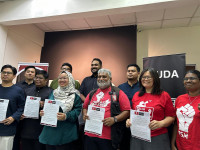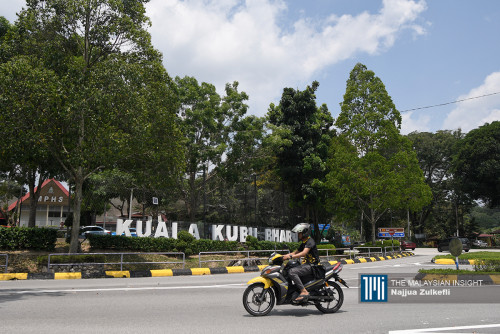TAKING cues from a Whatsapp note, I wore my lightest coloured shirt to avoid insect bites and covered shoes (high-quality Phua Chu Kang yellow rubber boots to be precise), “appropriate for kebun geography.”
My newly acquainted contact, acquired by combing through the dens of cyberspace, was more than eager to show his urban replanting efforts, after a video of his lone initiative of cleaning 360L worth of garbage within his neighbourhood for two consecutive days went viral online a couple of weeks ago.
Giving the nod of approval for my attire following his memo, 34-year-old Afiq Asyran Yusof brought me straight to the starting point of a flourished greenery’s walking trail spreading across three acres.
Looking ahead, the ‘unsung hero’ (labeled by netizens praising his recent efforts) shared that the garden we were about to tour is now gazetted as a community garden under Majlis Perbandaran Kuala Langat’s Program Local Agenda (LA21), thanks to the support of his neighbours and the local resident association.
Deep-rooted passion
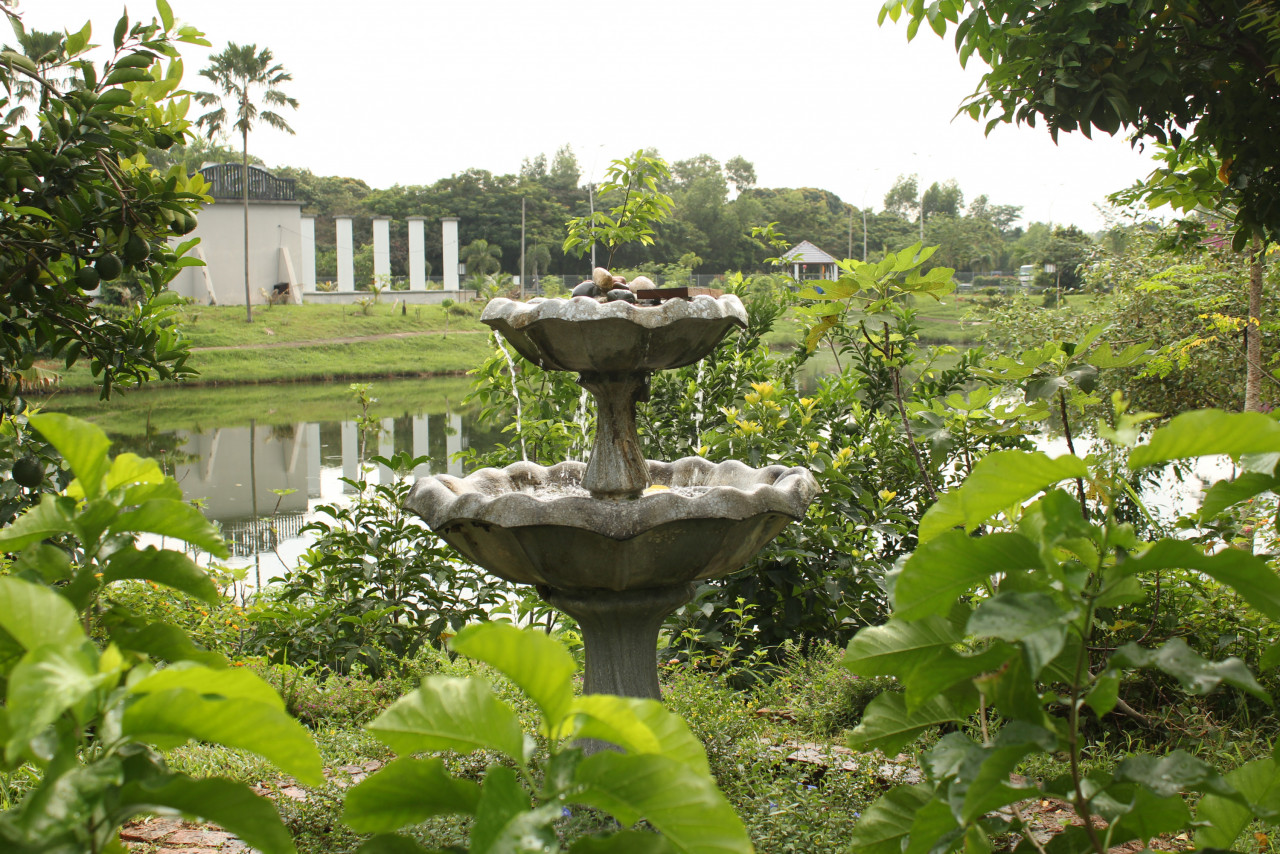
“See here, it’s your common garden lizard,” the science biology graduate pointed out in excitement.
Noting that the actual prime time to catch the birds, bees and butterflies to be a little later just before noon strikes, one still can’t help to marvel at the magnitude of Afiq’s environmental activity, having created such a lush ecosystem that makes it easy to ignore the traffic disturbances of a nearby road.
"I follow Douglas W. Tallamy’s method of replanting, prioritising at least 70% of the trees in this garden to be local species. The reason behind it is so the trees are able to support the local animals (insects, birds, etc) by becoming a host plant for various biodiverse organisms.
“Basically, it helps to promote a more sustainable habitat that is able to thrive,” he shared, detailing inspirations from the author’s book titled ‘Nature’s Best Hope’.
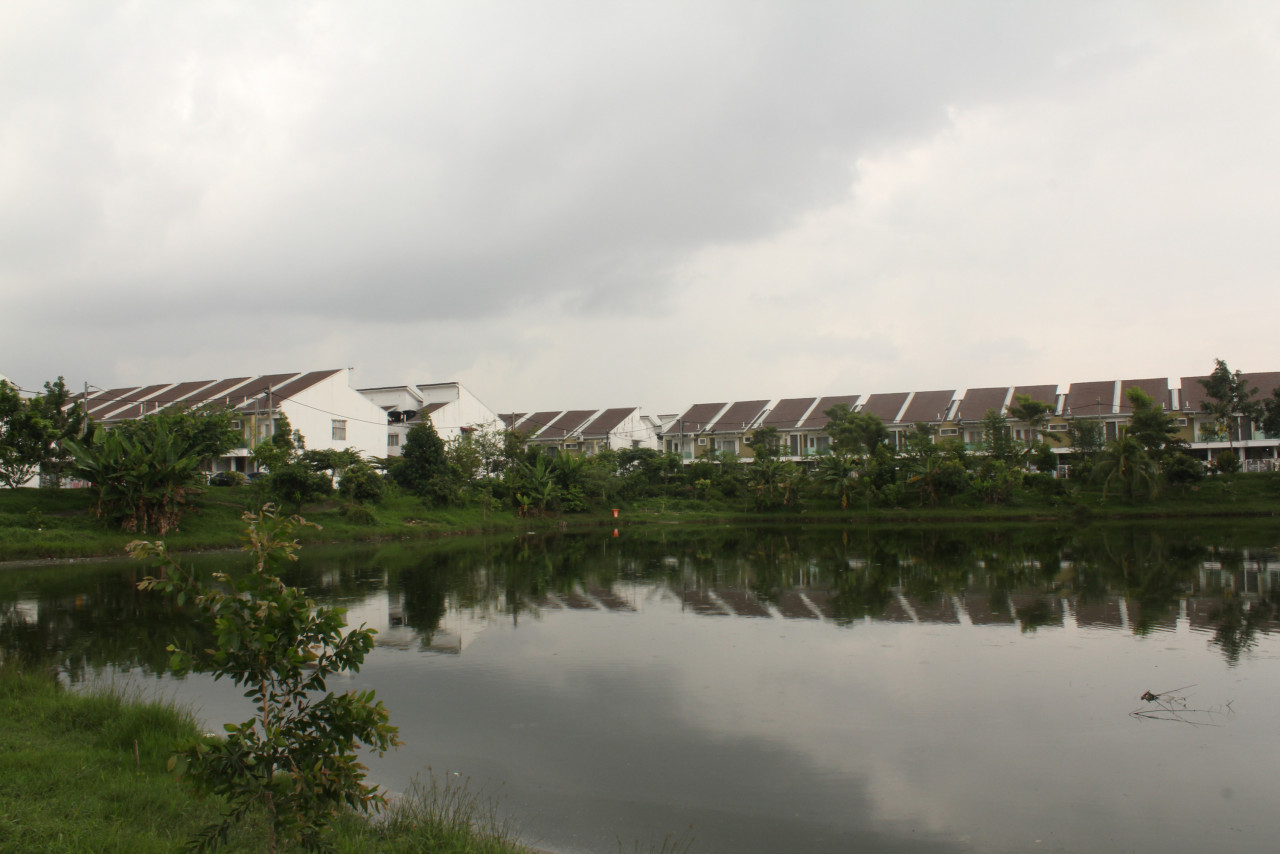
Afiq references a lot of approaches from his list of reads – other notable ones include ‘The Hidden Life of Trees’ by Peter Wohlleben, ‘Permaculture’ by Sepp Holzer and ‘The Botany of Desire’ by Michael Pollan.
He also mirrors replanting techniques recommended by Japanese botanist Akira Miyawaki and looks up to Jadev Payeng who is known as the Forest Man of India.
“He spent decades (30 years) of his life planting trees and restoring wildlife.”
Tracing back to a time when his love towards the environment prospered, Afiq recalls studying in Universiti Malaysia Terengganu “near Mengabang, Terengganu where there is a habitat of river otters.”
“On my daily commute from my hostel to campus, I would see a lot of these creatures dancing and playing. I developed a strong intention to contribute back directly to the natural ecosystem and community ever since,” he said.
“After buying a house here in Selangor, I saw a potential to pursue and develop it with the available plot of land near my home. The rest, as they say, is history.
"I want this garden to be an arboretum (planting and conservation of trees) for tropical fruit trees,” he added.

We stopped in our tracks halfway through the tour of the parkland that Afiq passionately takes care of with the support of his neighbours, only to pick up plastic trash littered along the path where he annoyedly remarks, “this is why we don’t encourage human traffic. When there is a human, there is garbage.”
He requested not to disclose the exact location of the garden where we agreed to meet that early morning, and only allowed the article to publish ‘somewhere in Bandar Saujana Putra’. The concept of Afiq’s garden is not recreational; unlike the manicured landscapes you see in places like golf courses.
“Those [golf course type gardens] do not provide anything for the eco-diversity. I want this garden to be strictly for my community so it will create a sense of ownership or belonging.
“Hopefully it teaches them to treat it like a home, and look after it with more care,” he said, adding that instead other communities can help to build their own initiative for a larger and better effort of urban replanting.
“The lake (about one acre) that you see here is a flood retention lake, part of an effort to mitigate flooding from happening in the area,” shared Afiq.
“Every time after a heavy rain, garbage would come through the drainage and end up in the lake. I would say it’s easily around 200 kg of garbage we collect (usually coming from the shop lots close by). It’s tiring but we just do it.”
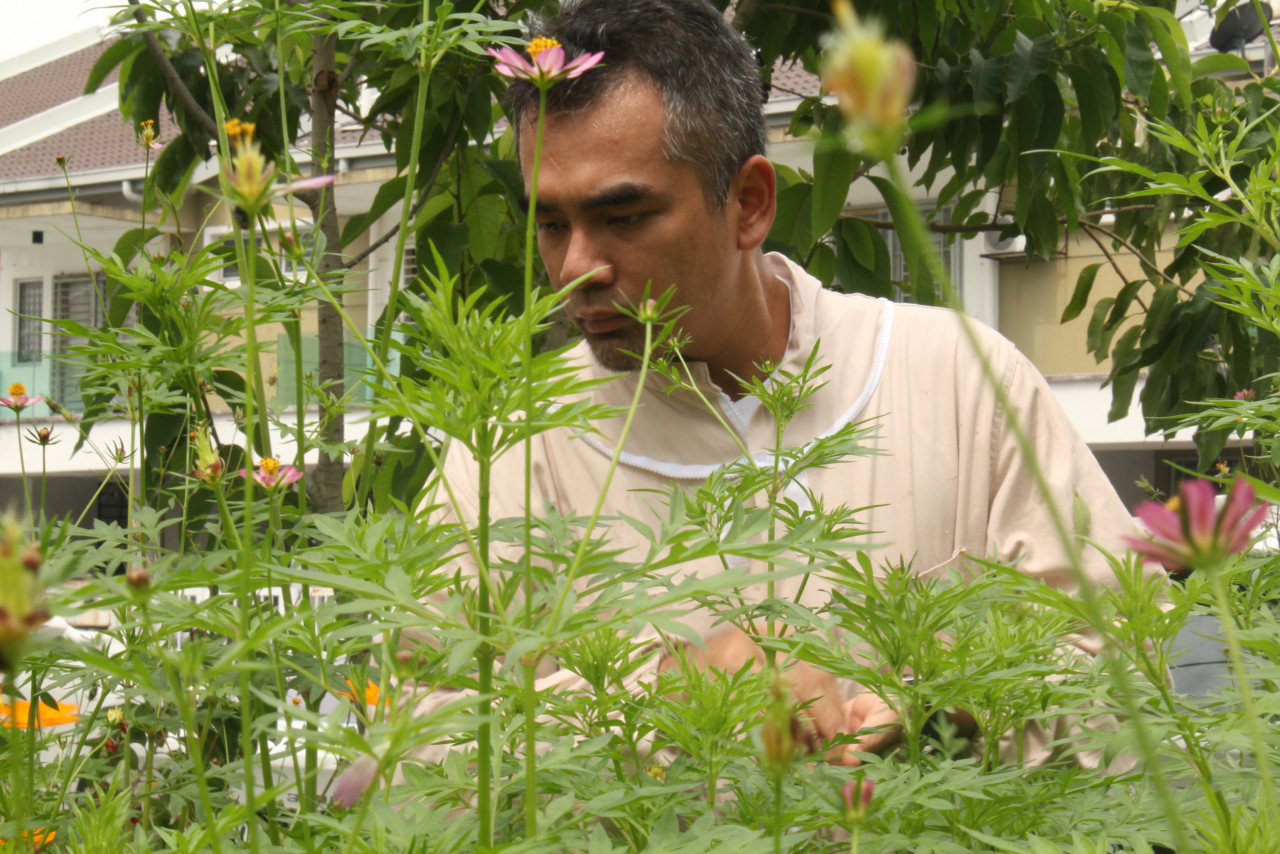
"If you check on Google street view, there is an outdated panorama where you can see what this plot of land was previously. You will also see how much we [the community] have done to flip it around.
“I personally still feel it's not enough, but every time I see the birds and butterflies flying around, I can’t help but to feel content,” he added.
Emphasising on the importance of having to live harmoniously with nature, Afiq shares "our programme is way ahead of what Malaysians could understand, such as the (concept) of honeybees here.”
"We allow them to be near residential homes (with bee houses erected in the community garden) to educate the public that the honey bees are very important for pollination.
“We want the community here to also understand that bees are harmless if left undisturbed. If let's say one day honey bees are extinct, our food security will be at risk.”
"I hope that more humans will be able to mingle and cultivate a close relationship with nature. We deforested our lands, cutting the trees down for industrial and development purposes, but have we done enough to replant them? I would say no, at least not yet,” Afiq said, before adding that getting involved in urban replanting – on some level – could be “our last hope.”
Composting together
The time spent at Afiq’s community garden saw us discussing how individuals can start working towards preserving our ecosystem by being hands-on with regards to waste separation.
This certainly relates to the discussion on organic composting for urban, outdoor and home gardening.
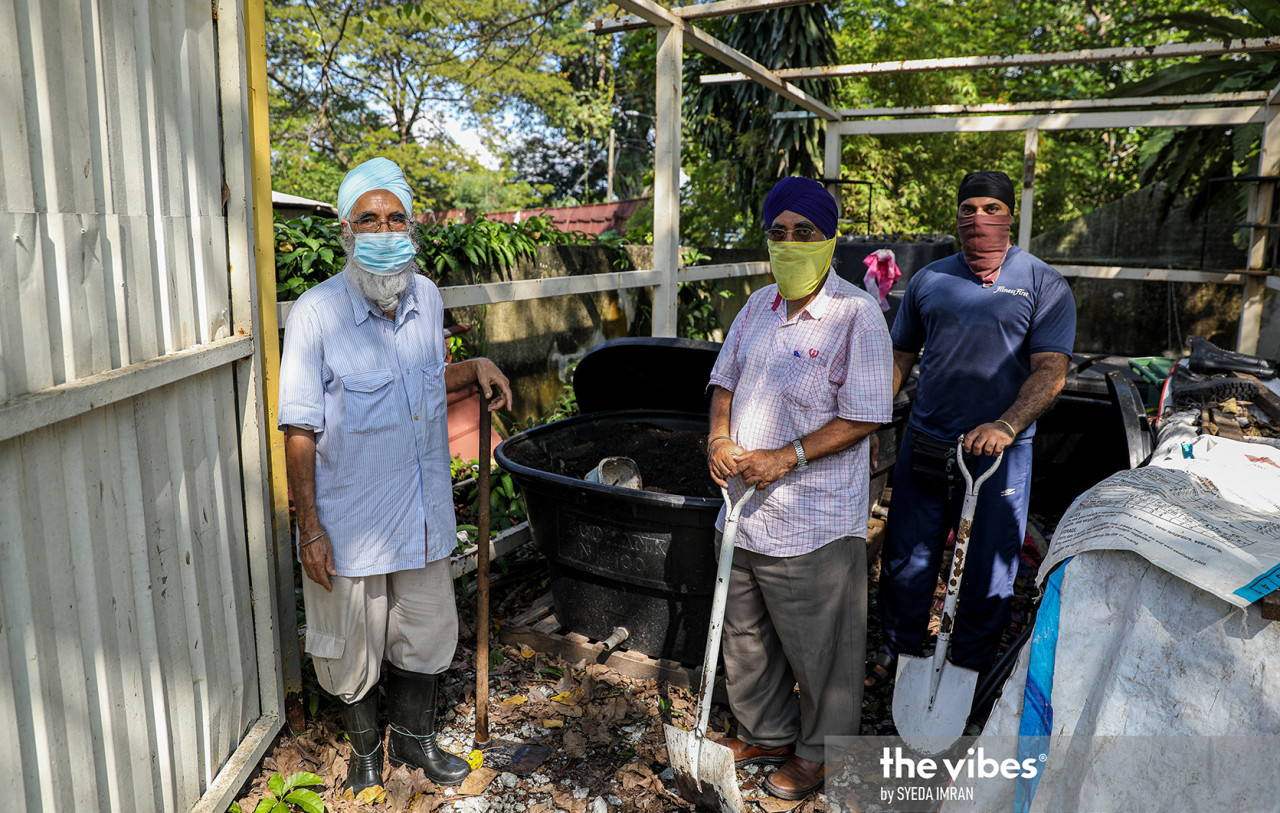
A visit to the Gurdwara Sahib Sentul (Sikh temple off Jalan Haji Salleh, Sentul) to meet with the community – faithfully helping to promote a more sustainable lifestyle among them, as well as society-at-large – allowed me to understand the depths of composting practices better.
“Any community can come here and help us with the composting,” shared 76-year-old Gian Singh, with a warm greeting by the parking bay next to where the organic composting activities are done, “usually every Wednesday and Saturday morning.”
“People can bring their own gatherings of plant materials, vegetable peels and – already separated – food waste from home, it’s not a problem but we also need manpower.
“I'm not so young myself and I only do light work, so we welcome more participation. People can also take and bring back home organic fertilizer for free if they want,” said Singh, who is a retired accountant and one of the volunteers that frequently helps out.
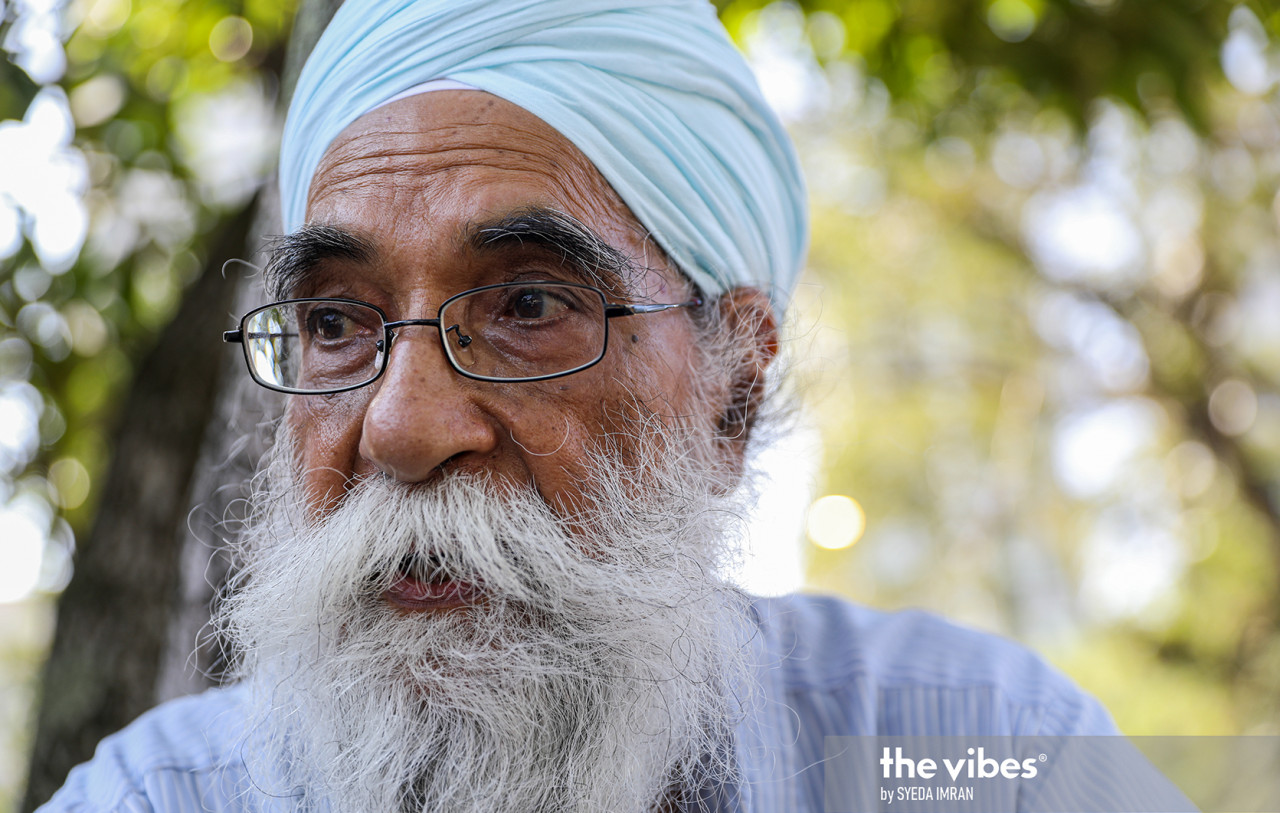
The Gurdwara Sahib Sentul (GSS) composting project started back in November 2019 when the temple was anticipating a “prayer and singing programme at the Gurdwara on a national scale.”
“Some of us here, together with Jespal Sidhu (who helped to first introduce composting practices and is an expert) were worried about the amount of food waste to come.
“We had decided to prepare ourselves and do something about it rather than just throwing them away and requesting for more bins,” shared Singh.
“With the help of an agriculture expert, we began to start the composting as the five-day programme commenced.
“First, we took some sticks and put them on the ground because this allows for any excess water to go down into the ground. Then, we took some leaves from the mango trees here and put the vegetable peels and added some soil.
“To start off the compost process, we needed cow dung. One of the volunteers managed to gain it and we created a huge pile within one day adding leaves and water continuously.
“Everybody became motivated, so we made it a point to continue the activity twice every week since then,” Singh added.
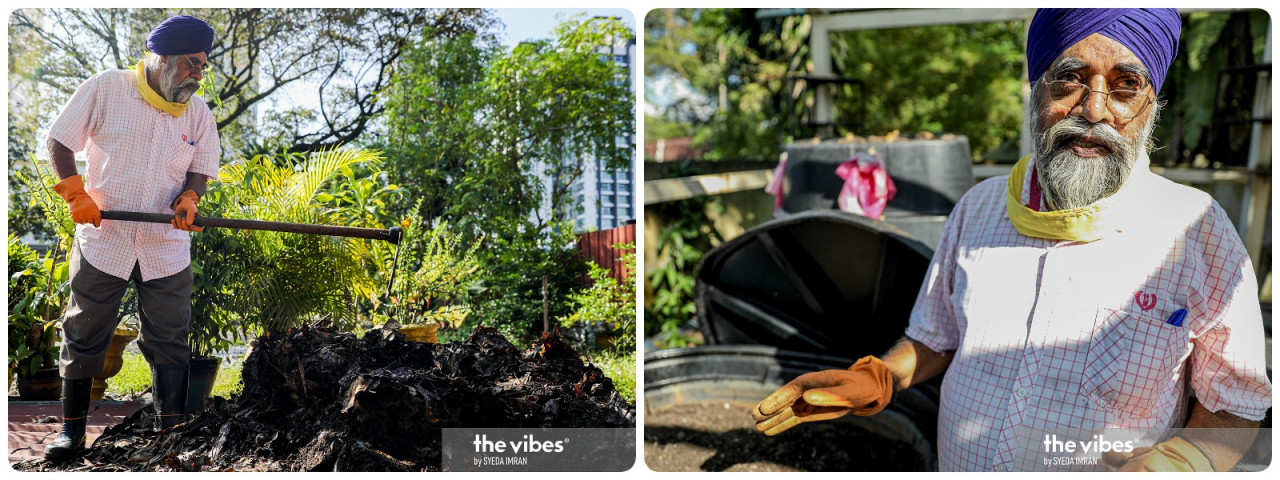
Also closely involved from the start of the project is Chamkaur Singh, 68, fondly known as ‘Uncle C.K.’. His brawny son Sukvinder Singh, 41, joined him during the interview.
Together, they gear themselves up for the laborious undertaking of having to pile up new food waste, sifting it to combine with the existing composts.
“It takes about five to six months before an organic compost is ready to be used as organic fertilizer because we don’t have the machines,” said Uncle C.K.
His music academy is located just outside the Gurdwara. Hence, it’s unsurprising that he has become one of the more familiar faces participating in the activity.
When asked if he sees composting as an art, he shares, “It is definitely an art – you must put your mind and soul together. Trees and plants need love you know.”
“Care and love is very important in this world, and if you handle things in such a way you will succeed. Anything good you do in life, it can’t go unnoticed.
“For some reason we had become the talk of the town for our activities here, and it’s great that more people are becoming interested and wanting to share this value,” he added.
The project is open to public donations to build a concrete flooring, roof for storage and fence totaling RM20,000.
Understanding climate change is very important and what better way to do so than by participating in such community initiatives.
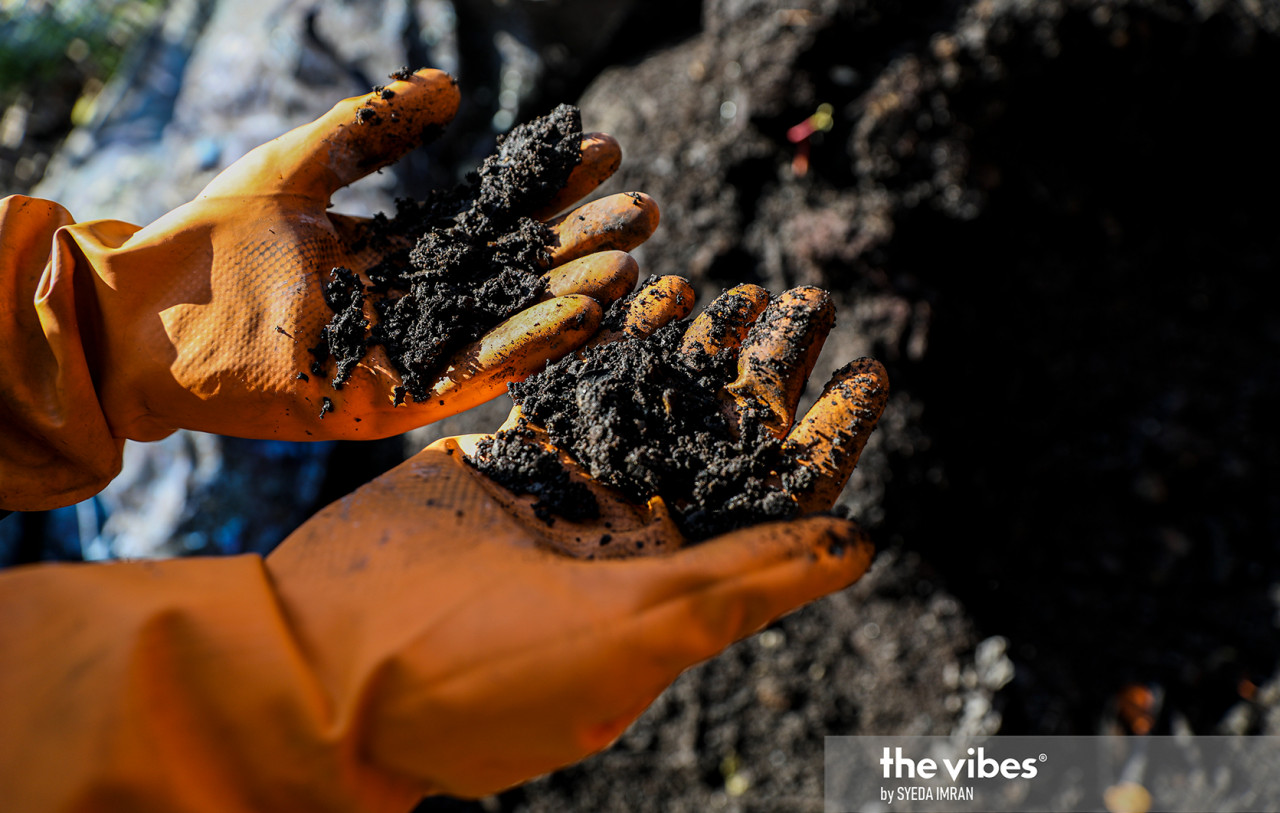
However, Singh notes the challenge of maintaining sustainable practices still goes back to people lacking adequate education of seeing waste management as important “because they see it as a dirty job.”
“We don’t take rubbish seriously because we don't see beyond throwing it in the bin, thinking it’s just for Alam Flora to be taking on the full responsibility.
“That said, some of the younger generations are beginning to understand because they are learning about it on various media. We do get a few young people coming in and that’s great,” he added.
True enough, the group had a fortuitous visit from 25-year-old Phavanjit Kaur, who heard about the ongoing composting activities at the location and wanted to help out with the work that day.
“What made me join is the fact that it's being done here at the local Gurdwara. A lot of us youngsters are aware of climate change and we know that it takes a lot of effort to address it.
“But to see older generations doing it, I think it motivated me further to start doing something,” said the project manager at a banking institution.
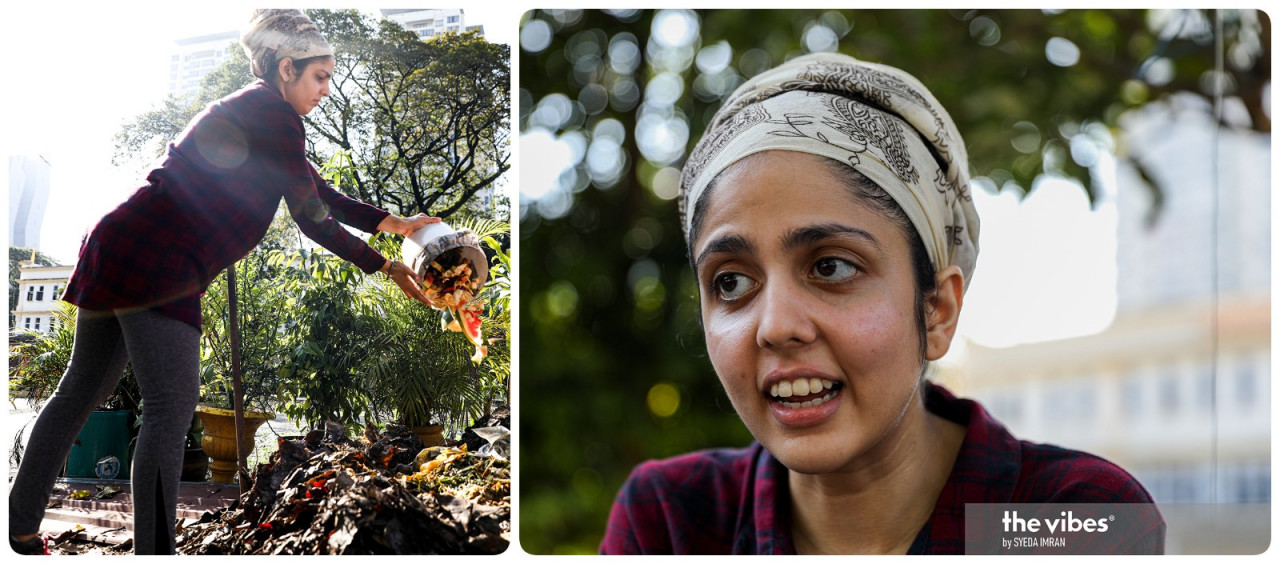
“I don't feel any sense of reward because I do feel that it's a civil responsibility, especially given that we are getting closer to the detrimental effects of climate change.
“So, I do think that a lot more youngsters are interested. It's just a matter of wanting to do it or not.”
According to Gian Singh, the composting efforts done in Gurdwara Sahib Sentul is able to reach between 300 to 400 Sikh homes, “but of course we can double – or have four times – the size if more people are willing to join us and get involved with the activity if the interest extends beyond.
“That way we can make more organic fertilizer for the good of Malaysia, the world and its climate.” – The Vibes, January 2, 2020



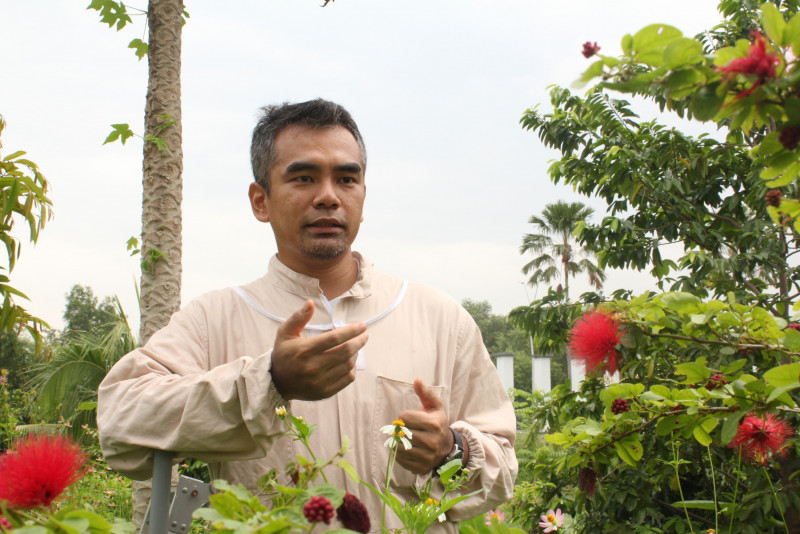


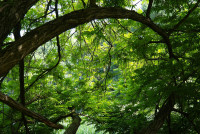
.jpeg)






